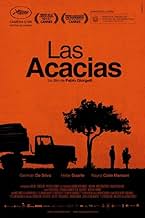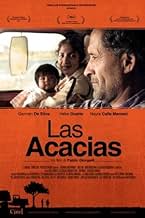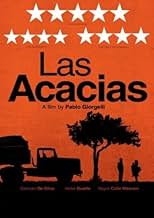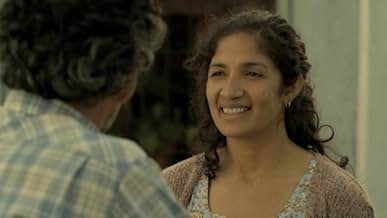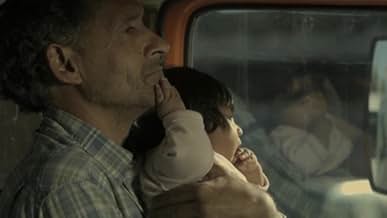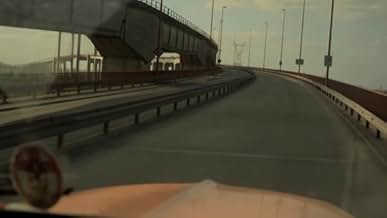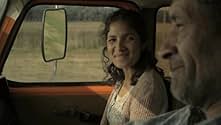IMDb-BEWERTUNG
6,9/10
2510
IHRE BEWERTUNG
Füge eine Handlung in deiner Sprache hinzuReluctantly, a dour long-distance truck driver agrees to give a lift to a Paraguayan single mother and her five-month-old daughter to Buenos Aires. Can the palpable silence soften up the tac... Alles lesenReluctantly, a dour long-distance truck driver agrees to give a lift to a Paraguayan single mother and her five-month-old daughter to Buenos Aires. Can the palpable silence soften up the taciturn trucker's sullen heart?Reluctantly, a dour long-distance truck driver agrees to give a lift to a Paraguayan single mother and her five-month-old daughter to Buenos Aires. Can the palpable silence soften up the taciturn trucker's sullen heart?
- Regie
- Drehbuch
- Hauptbesetzung
- Auszeichnungen
- 19 Gewinne & 22 Nominierungen insgesamt
Germán De Silva
- Rubén
- (as Germán de Silva)
Matilde Jazmín Mamani
- Prima Anahí
- (as Matilde Jazmín Quispe Mamani)
Odón Morán López
- Camionero Paraguayo
- (as Odón Morán Lopez)
Darío Luchetta
- Camionero en asado
- (as Darío Lucchetta)
Yanina López
- Hija dueña parrilla
- (as Yanina Paz López)
Empfohlene Bewertungen
A visual narrative on ordinary folk with a simple but instantly recognisable theme - loneliness. Argentina of late has produced some magical road films featuring the lives of everyday characters - and they are all a joy to watch. It matters not that the dialogue, what little there is of it, is in Spanish. It could be a silent film or dubbed in Arabic. The film speaks for itself. It is so well crafted. A roughneck lorry driver who has travelled the highways of Argentina for 30 years and used to his own space, is ordered by his boss to take one of his journeys south to Buenos Aries with a passenger - a young mother and child. Gradually, as the journey progresses and he becomes more and more frustrated with the noise and demands of the child, but a bond slowly comes through. This is a very touching film and very well made. The open road is shown not as dramatic backdrop in panorama - but as a close-up with each of the characters in the shot. There are a number of comments made by reviewers here that liken the film to watching paint dry etc. I think these people went to the cinema expecting another Die Hard, Steven Seagal, Van Damme, Terminator shoot em up Hollywood rubbish. Suggest that in future they read the poster before venturing further.
Cinema isn't just there to entertain (or make money) it is also to educate and generate thought. Well recommended piece of social realism.
Cinema isn't just there to entertain (or make money) it is also to educate and generate thought. Well recommended piece of social realism.
I watched this film last night and I thought it is going to be boring. It wasn't the case in the end, because I felt like I was part of the journey, I was in the car and I couldn't hardly wait to get to Buenos Aires, and once there, I felt like I know my trip mates better. :) The baby was more than amazing! She's like a little star! I think when she'll grow up and see her performance she'll have all the reason to be proud for herself :) An achievement :)
It may seem like the whole film is event-less but I was positively surprised to see that the outcome was better then expected. I can easily imagine this to happen for real... Like I said I only recommend this film only if you're not infected with the holywoodian kind of "film".
It may seem like the whole film is event-less but I was positively surprised to see that the outcome was better then expected. I can easily imagine this to happen for real... Like I said I only recommend this film only if you're not infected with the holywoodian kind of "film".
A middle-aged truck driver's long years of hauling lumber from Asuncion, Paraguay to Buenos Aires is etched on his grizzled face. Looking as if he hasn't shaved in weeks, maybe months, his body language displays a passive solitude, as if he has become reconciled to a world of emptiness. Winner of the Camera d'Or for the best first feature in Cannes, Pablo Giorgelli's Las Acacias is a work of deceptive simplicity, a film that captures the essence of human longing mostly through facial expressions, glances, and gestures. Though it is mainly shot inside the cab of a truck and has very little dialogue, it never feels claustrophobic or dull, its natural performances allowing us to feel as if we are observing events in real time.
The driver, Rubén (German de Silva), is transporting a load of acacia wood to Buenos Aires and has agreed to bring Jacinta (Hebe Duarte), a young Paraguayan woman with him at the request of his boss. When he finds out that the woman, heavily loaded down with suitcases, is also bringing her five-month old daughter, Anahi (Nayra Calle Mamani), he says nothing, but the annoyed look on his face tells the story. Nothing is said for the first thirty minutes as they begin their 1500 kilometer journey, but the silence is not oppressive. Rather, there is simply quiet as the languid motion of the truck sways to the rhythm of the road. Giorgelli said that "I wanted you to feel the fatigue of this long journey," and we do. It is long but never tiring, however.
As the camera reflects on the passing scenery and the images the driver sees through his rear-view mirror, we observe the eyes of the driver, his passenger, and the baby whose look is the most expressive of all. We know nothing of his background or that of the woman's. Ruben's frozen inability to express emotion begins to melt, however, as Jacinta's warmth and the baby's sweet smile awakens in him a sense of his lost humanity. During the course of the trip they begin to open up, slowly revealing their troubled past. He tells Jacinta that he has a son that he hasn't seen in eight years, and she tells him that Anahi has no father.
Jacinta talks to her daughter in the ancient Guarani language and Ruben asks her to translate. When Anahi begins to cry, Rubén quiets her by giving her a cup to play with, and a barely articulated affection emerges. Written by Salvador Roselli, Las Acacias is a film of emotional richness that has no extraneous conversation, enigmatic symbolism, or background music. It is a film where nothing happens and everything happens, that understands that silence alone, in the words of British author Karen Armstrong, "is appropriate for what lies beyond words." A work of deep and abiding humanity, Las Acacias is one of the best films of the year.
The driver, Rubén (German de Silva), is transporting a load of acacia wood to Buenos Aires and has agreed to bring Jacinta (Hebe Duarte), a young Paraguayan woman with him at the request of his boss. When he finds out that the woman, heavily loaded down with suitcases, is also bringing her five-month old daughter, Anahi (Nayra Calle Mamani), he says nothing, but the annoyed look on his face tells the story. Nothing is said for the first thirty minutes as they begin their 1500 kilometer journey, but the silence is not oppressive. Rather, there is simply quiet as the languid motion of the truck sways to the rhythm of the road. Giorgelli said that "I wanted you to feel the fatigue of this long journey," and we do. It is long but never tiring, however.
As the camera reflects on the passing scenery and the images the driver sees through his rear-view mirror, we observe the eyes of the driver, his passenger, and the baby whose look is the most expressive of all. We know nothing of his background or that of the woman's. Ruben's frozen inability to express emotion begins to melt, however, as Jacinta's warmth and the baby's sweet smile awakens in him a sense of his lost humanity. During the course of the trip they begin to open up, slowly revealing their troubled past. He tells Jacinta that he has a son that he hasn't seen in eight years, and she tells him that Anahi has no father.
Jacinta talks to her daughter in the ancient Guarani language and Ruben asks her to translate. When Anahi begins to cry, Rubén quiets her by giving her a cup to play with, and a barely articulated affection emerges. Written by Salvador Roselli, Las Acacias is a film of emotional richness that has no extraneous conversation, enigmatic symbolism, or background music. It is a film where nothing happens and everything happens, that understands that silence alone, in the words of British author Karen Armstrong, "is appropriate for what lies beyond words." A work of deep and abiding humanity, Las Acacias is one of the best films of the year.
In Paolo Giorgelli's quiet film 'Las Acacias', not a lot happens. A truck driver with a load of wood (hence the title) gives a lift, somewhat reluctantly, to a woman with a child. They don't talk a lot, but they're both lonely; by the end of the movie, they decide they'd like to see each other again. And that's it. The film covers a journey of 800 miles through South America, but there are no stunning landscapes on view: just a lot of scenes of two people sitting quietly in a cab. And yet, almost strangely, it doesn't drag: there's a feeling of truthfulness that compensates for the absence of action. In spite of being almost unremarkable by design, it's understated quality tells in the end.
Las Acacias begins with the sound of a chainsaw followed by a lumberjack felling a fairly large tree. Many others fall and they are then loaded on to a tractor trailer. A man drives alone, lost in his thoughts, as he carries the cargo through the rural countryside. He stops at a truck stop to wash up and we can see a scar, curving from his back shoulder to his ribs. He steps outside to smoke a cigarette and a young woman approaches with a baby and asks if he is Ruben. He replies yes and that he was not told about the child. She explains that it is a misunderstanding and they get into the rig and Ruben seems less than thrilled with his passengers.
First stop, "welcome to Paraguay" on a sign and he tells her to get out and walk across the border and he will pick them up on the other side. He fills out the necessary paper work and then eats dinner alone. She gets back in and at the next stop the officers ask to see her papers and ask if she has the fathers permission to travel with her offspring. She answers that there is no father. Ruben takes the pair to a diner so that madre can feed little nina.
Back on the road, he finally asks her name, which turns out to be Jacinta and her child is Anani. She asks if he has a family, and at first he says no but then admits to having a son. On route he pays a short visit to his sister and afterwords finds a peaceful lake to sit beside with his passengers where they discuss mundane things like dogs, which they both like, and Anani's age which is five months. There is very little conversation, with most communication being non verbal. Both actors are very good at showing their feelings with facial expressions. As the drive progresses, Ruben grows more and more attached to Jacinta and Anani and as it nears the conclusion I actually cared what happened to them, which is a rare thing in most movies. I do not agree with the negative reviews posted, complaining about the lack of dialogue. Be patient and let the subtlety overtake you, as it did me.
First stop, "welcome to Paraguay" on a sign and he tells her to get out and walk across the border and he will pick them up on the other side. He fills out the necessary paper work and then eats dinner alone. She gets back in and at the next stop the officers ask to see her papers and ask if she has the fathers permission to travel with her offspring. She answers that there is no father. Ruben takes the pair to a diner so that madre can feed little nina.
Back on the road, he finally asks her name, which turns out to be Jacinta and her child is Anani. She asks if he has a family, and at first he says no but then admits to having a son. On route he pays a short visit to his sister and afterwords finds a peaceful lake to sit beside with his passengers where they discuss mundane things like dogs, which they both like, and Anani's age which is five months. There is very little conversation, with most communication being non verbal. Both actors are very good at showing their feelings with facial expressions. As the drive progresses, Ruben grows more and more attached to Jacinta and Anani and as it nears the conclusion I actually cared what happened to them, which is a rare thing in most movies. I do not agree with the negative reviews posted, complaining about the lack of dialogue. Be patient and let the subtlety overtake you, as it did me.
Wusstest du schon
- WissenswertesFilmed in five weeks between Paraguay and Buenos Aires.
- VerbindungenFeatured in The Smallest Red Carpet, But the Biggest Heart (2011)
Top-Auswahl
Melde dich zum Bewerten an und greife auf die Watchlist für personalisierte Empfehlungen zu.
Details
- Erscheinungsdatum
- Herkunftsländer
- Offizielle Standorte
- Sprachen
- Auch bekannt als
- Las Acacias
- Drehorte
- Produktionsfirmen
- Weitere beteiligte Unternehmen bei IMDbPro anzeigen
Box Office
- Bruttoertrag in den USA und Kanada
- 6.000 $
- Eröffnungswochenende in den USA und in Kanada
- 6.000 $
- 9. Sept. 2012
- Weltweiter Bruttoertrag
- 355.979 $
- Laufzeit1 Stunde 22 Minuten
- Sound-Mix
- Seitenverhältnis
- 1.85 : 1
Zu dieser Seite beitragen
Bearbeitung vorschlagen oder fehlenden Inhalt hinzufügen

Oberste Lücke
By what name was Schöner als Akazienholz (2011) officially released in India in English?
Antwort
